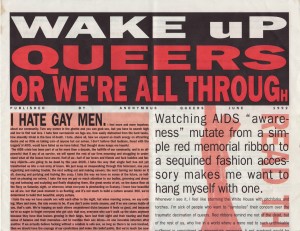Later today, Barack Hussein Obama will ratify his already historic accomplishment when he once again swears the oath of office as President of the United States, and, predictably, one will again hear his historic accomplishment characterized in a way that raises troubling questions about the social and cultural construction of racial identities: “first African American (read black) president reelected” is a story much easier to tell than “first commonly acknowledged multi-racial president reelected.” The president’s own statements, such as the references to his white grandmother in A More Perfect Union, his memorable 2008 speech on race, suggest the president himself wishes the complexities were more accessible. No doubt, the president understands, better than most, how systems of racial oppression depend on the vigilant maintenance of the false binary between white people and people of color, enforcing by law and custom the mistaken notion that racial differences define discrete categories, intentionally obscuring the liberating nature, specifically, of the infinitely diverse and continuous categories of racial expression, and, generally, of the multidimensionality of racial identity. A heavily reductive, and plainly racist culture seems inclined to erase Obama’s maternal ancestors, just as the slave laws of the southern states once disregarded the white heritage of the multi-racial child, sired by a white slave-owner and born into bondage. The message, straining though it does against the facts, is clear: one must be either black or white, and to be white is to be somehow pure, so that any amount of blackness negates all whiteness. Conceptually, the color line remains inviolate.
In recent decades, intersectionality theory, exploring as it does how systems of oppression operate simultaneously and interdependently across biological, social, and economic axes of sex-gender, race, class, ability, and sexual orientation, has illuminated the significance of our collective short-handing of the president’s racial complexity, by revealing the centrality of the fallacy of the discrete category to many recognized matrices of domination.
The insight is especially poignant for queerkind, and highlights with sadness our estrangement from one another: queer from gay, gay from lesbian, cisgender from transgender. By definition, we all struggle within the intersected tensions experienced along at least two of the principal axes on which oppression operates: sex-gender and sexual orientation. The practice of non-conformative sexual orientations entails non-conforming sex-gender behaviors, while transitional and intersex sex-genders occasion infinitude of potential non-conformative sexual orientations.
Certainly, much queer estrangement arises from justified anger, and when, as a person of white cis-male privilege, I witness a call-out, or see resentments rooted in sex-gender or racial injustices otherwise manifest, or find myself growing indignant, I try to remember what Obama said about such anger in that 2008 speech:
That anger [as had been expressed by Reverend Jeremiah Wright] is not always productive. Indeed, all too often it distracts attention from solving our real problems…But the anger is real; it is powerful, and to simply wish it away, to condemn it without understanding its roots only serves to widen the chasm of misunderstanding that exists between the races.
Importantly, just as the black women who originated intersectionality theory advanced a legitimate critique of twentieth century feminism as then articulated by white women, so intersectionality theory yet constitutes a legitimate critique of a gay movement politics that ignores sex-gender.
The fallacy of the discrete category perhaps finds its greatest range of influence and its most profound effects along the axis of sex-gender, by virtue of its universal and early application. Indeed, the question of whether one is girl or boy, a question replete with binary assumptions and tautological arrogance, greets each and every one upon birth, and the answer colors, in pink and blue pastels, a lifetime of gender expectations to come. Among the privileges attending whatever visible genitals one might then present, society has not recognized the privilege to alter, defy, disregard or escape those genitals, except to surgically enforce the fallacy of the discrete category, in this case the reductive boy-girl binary, as in the mutilation of intersex infants or the sterilization of transgender adults. Although with considerably less tragic results, this fallacy dominates even the most sex-gender-privileged among us, blinding us to the inauthenticity of the binary regime and hardening us against our more empathic impulses, impulses that might mitigate the estrangement between those who differ only in how they differ.
These complexities, unfortunately, like the complexity of the president’s racial identity, challenge our comprehension, remaining inaccessible beyond a shroud of commonplace misperception. To see through the veil is to perhaps glimpse the turning of Yeat’s falcon in the widening gyre: first-wave feminism discounting the intersection of race and sex-gender, then, more recently, the gay movement discounting the intersection of sexual orientation and sex-gender, and now, this latest controversy of estrangement between second-wave feminism and twenty-first century transgender politics, in which feminism twists itself into a defense of essentialism, as if to discount the intersection of sex-gender with itself, or stated another way, as if to discount the intersection of the complex of traits we commonly consider to determine a person’s “sex” and the complex of traits we commonly consider to determine a person’s “gender.” Perhaps no other intersectionality better reveals the error of essentialism and the fallacy of the discrete category, the very tools historically chosen to subjugate all females.
In her recent book, Irresistible Revolution: Confronting Race, Class, and the Assumptions of LGBT Politics, Urvashi Vaid writes with insight and compassion about the very complexities which now seem to estrange queerkind, and the practical realities, for the queer movement, of what theorists call intersectionality. Vaid, herself no stranger to the complexities of intersectionality, either in her personal life as a queer woman of color born to the immigrant working class, or as a leading light of queer liberation, marshaling resources and organizing people in empowering ways for more than three decades, convincingly argues that “…justice means intersectional practice…” and that to truly succeed, the queer movement must expand beyond the narrow pursuit of equal legal inclusion in the established norms to instead transform the norms themselves. Having taken her title from a quote by Toni Cade Bambara, Vaid writes in the introduction:
For me, an irresistible revolution is one in which the LGBT movement deploys the power it has gained to challenge and change traditions of ignorance, violence, poverty, and authoritarian control that continue to dominate the world. This moment calls for a renewed progressive and feminist politics defined not by narrowing but by expansion. It calls on us to answer the question posed by the Indian gay advocate and lawyer, Arvind Narrain: “Is the imagination of queer politics merely about access to rights for queer citizens or also about questioning structures which limit the very potential of human freedom?”
Since Karl Marx first described the materialist approach to understanding history, movements for social, legal, and economic change have paired these words: revolution and transformation. Vaid uses the words seemingly interchangeably, as have I, even in these pages. But the disambiguation of the two words might guide the queer movement well as it navigates “this moment,” for while any transformation can be revolutionary in some sense, not all revolutions are transformational in any sense. Writer and activist Starhawk, in what may be her most powerful book, Dreaming the Dark, uses these words seemingly interchangeably as well, but she also cautions against the revolution that merely replaces one complex of external power structures with another, the revolution that merely comes full circle, the revolution that alters the order of power structures without transforming the structures themselves. Transformation, after all, is about changing the form (e.g. the institution of marriage itself), not the content, (e.g. whom law and custom permit to marry) and revolution, too often, while changing the faces of those exercising power-over, leave the old shapes of external power structures intact. The story of the non-transformational revolution, therefore, is, for Starhawk, a story of estrangement as much as the story of apocalypse, the story of good against evil, or the story of the fall, all instruments of culture employed to the singular purpose of domination.
I agree with Vaid that to succeed in any meaningful way, our politics must stretch to the transformational, not merely the revolutionary. To do so, we must begin, individually and collectively, to open our minds to the complexities of our inner selves and our public identities. We must recognize that a queer movement that fails to address issues of race, class, ability, and sex-gender will fail to transform, regardless what revolutions it might accomplish. We must act according to principles of justice that transcend the profuse and continuous and fluid categories of identity we wrongly perceive as few and discrete and fixed. We must unite in a coalition dedicated to racial justice and economic justice and sex-gender justice no less than queer justice because “…justice means intersectional practice…”
All of these concerns are connected already, in the fallacy of the discrete category, whether we connect as allies to unseat it or do not. All of these causes have essentially always been one, an age-old lurching away from domination, whether we work as one well-networked coalition for global justice or do not. Failing to recognize these connections in our puzzle of intersectionality is more than a mere conceptual mistake, however, because movements for social and legal and economic change are not mere abstractions. Exclusion of people of color, or transgender people, or lesbians, or differently-abled individuals, or any of our queerkind from circles of queer power, and exclusion of their concerns from the movement’s agenda also constitutes a tactical mistake because the movement depends on popular support from an ever more demographically diverse population (both in the sense that once predominantly white nations like the US are ever more demographically diverse over time and in the sense that as the movement expands globally, it encompasses ever more demographically diverse populations around the world) for success. These same exclusions constitute a strategic mistake because they force a narrowing of the movement’s sense of collective purpose, deprive it of the innovation and evolution that arises from collective thinking and collective action in diverse groups, and imperil its long-term sustainability. Moreover, and perhaps most troubling to me personally, these exclusions constitute an ethical mistake because they betray queer moral values of authenticity, empathy, and mutual care. Only by reclaiming these values do I believe we can overcome our estrangement from one another. Only by reclaiming these values do I believe we can forge a politics of transformation.
Throughout his 2008 presidential campaign, Obama sometimes expressed his ambition to be a transformational president, and he alienated many progressives when he elevated Ronald Reagan as his example. Perhaps, even after eight years, history will not credit Obama with changing the shape of anything, but if even a handful of people recognize in the president’s racial complexities, and our collective short-handing thereof, the falsehood of the discrete categories under which they struggle, then I must believe that a transformation is indeed underway.


